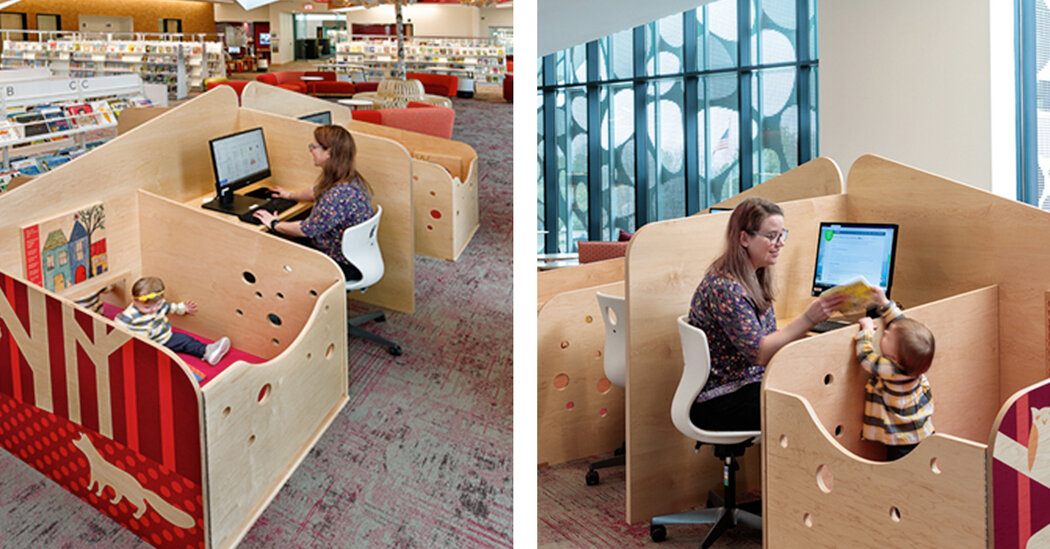A week ago, a tweet about a Virginia library that went out of its way to accommodate parents went viral. The tweet included a photo of a desk or carrel that had a built-in toddler-friendly sidecar, so that parents without child care who need to use the desk’s accompanying computer might have their kids occupied, distracted and comfortably contained for a few minutes, allowing them to focus.
Alissa Walker, a writer for the real estate and design site Curbed, asked about the genesis of these carrels, and learned that they came about through a collaboration between the library staff and a local interior design firm, and were created by a furniture company in Michigan.
“We kept seeing this problem with parents using the computer,” says Patty Conway, the community relations coordinator for the Richmond, Va., area library. “If they have a small child, they’d have to hold them on their knee and really struggle to balance their child-care needs with their needs to use the computer.”
This is a beautiful thing: The staff at the Henrico County Public Library saw that parents who used their public services were struggling, and worked to create an environment that accommodated them. Walker’s article is sensitive and informative. Unfortunately, that is not how it was interpreted on social media, because of a somewhat misleading headline: “Finally, a Desk for Working Parents.”
The responses, presumably from working parents, to an Instagram post about the article were scathing: “How about parental leave in line with most other developed economies?” “This isn’t real, right? It’s a joke. It has to be a joke.” “You forgot to add the father’s desk to show how they share this labor. Or is he off in a quiet room only doing one job and getting paid twice as much?”
I’m not really surprised by the vehemence of these replies. Parents of children under 5 in the United States often feel betrayed and abandoned by politicians and community leaders. And if all that someone saw was a headline perhaps implying that working parents’ problems could be solved by a desk with an attached playpen, it’s understandable why they’d be deeply annoyed. After all, a “desk for working parents” that really addressed our day-to-day challenges would be just a regular desk, and our kids would be elsewhere, in some form of affordable and reliable child care.
But it still saddened me to see a thoughtful, good-faith effort at problem-solving by a public institution get hit with that sort of backlash. More public places should create environments to accommodate small children and their caregivers. For example, if you’ve ever desperately needed to change a child’s diaper in public, you know how difficult it is to find a clean and comfortable place to do so. If you need to nurse or pump, you’ll have similar issues finding space.
When my kids were very little, I spent so much time feeling anxious when we were out and about. How long could I go before someone melted down or needed changing? How awkward and guilty would I feel when I got nasty stares from fellow patrons because I dared to bring a toddler who acted like a toddler into a public space?
The good news is that most people who read the original article instead of just scanning the headline and image will understand that those desks weren’t intended as a comprehensive fix for the systemic obstacles that parents in America face. The small things do help, and do matter, though. And I hope the attention this design is getting — good and bad — inspires more public agencies and facilities to think about who is using their services, and how to make their lives a little easier.
Tiny Victories
Parenting can be a grind. Let’s celebrate the tiny victories.
I told my two boys bananas were “power crystals” and now we’re going through one bunch a week.
— Josh Feingold, Encino, Calif.
If you want a chance to get your Tiny Victory published, find us on Instagram @NYTparenting and use the hashtag #tinyvictories; email us; or enter your Tiny Victory at the bottom of this page. Include your full name and location. Tiny Victories may be edited for clarity and style. Your name, location and comments may be published, but your contact information will not. By submitting to us, you agree that you have read, understand and accept the Reader Submission Terms in relation to all of the content and other information you send to us.




























